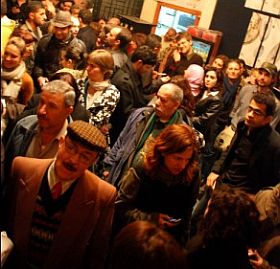


Dox Box Damascus 2011

The festival in Damascus still runs today and tomorrow. I left this morning and the few times I was in the cinema, it was full. Beyond any doubt, this festival – that has been running for four years – has found its place in the cultural life in Damascus. There is a hunger for films, from Syria, from other countries in the Arab world, well from all over the world. For films that never reaches Syria if not for Dox Box. The festival leaders told me, as just one example, about the atmosphere in the hall when naked Finnish men opened their hearts on camera in ”Steam of Life”, dividing the audience into those who found that the film crossed the line of what you can show, contrary to those who loved the film – and those who giggled whenever a new sequence introduced nudity! I have previously praised the selection of international films, good to hear and see that they are also watched with good audience numbers and that they are appreciated, as are the films of Kim Longinotto, guest of honour at the festival this year.
With Longinotto and Syrian artist Ahmad Moulla, I was in the jury of ”Voices of Syria” section of the festival. We saw 6 films and they were not on a very high general level, to be honest. The filmmakers tend to forget the visual side, they go for the words and very often with one political correct interview after interview to constitute the structure. The reportage genre is the inspiration, the journallistic tradition. The selection of the 6 was done from 17 films. We found a winner, one stood out for its story and commitment and main character, the result will be revealed at the closing ceremony tonight.
There is hope that this situation can change if you look at the parallelly running Campus training session that thematically is described below. There was talent to find among the 14 projects coming from 9 countries. Especially among the female directors, who dared to pick up controversial subjects for discussion, with a lot of energy and passion, even if there still is a long way to go for many of them before they acquire filmic skills and find their own voice. But for them the documentary film is to be made to change something or at least to point at something that needs to be changed. Combined with the many different funds and their connected training and development initiatives, there is reason for optimism that more creative documentaries will come forward. Seen in the light of the revolution in Egypt and its inspirational spread, the only thing EUropean filmmakers can do is to help training. The many European training programmes should be open, also for Arab filmmakers. In times of democracy building.